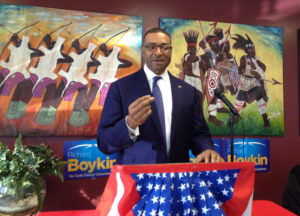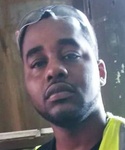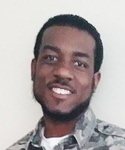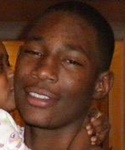By ANDY GRIMM
Chicago Sun-Times

Cook COUnty Commissioner Richard Boykin | Sun-Times file photo
While crime does not respect municipal boundaries, police agencies in Cook County have no uniform way to compare crime data or trace weapons used in crime, according to a report from a county task force on gun violence.
The wide-ranging report, released Wednesday after 10 months of research and public hearings, offers a variety of policy suggestions and suggested tactics to reduce violence in the county, from endorsing “hot spot” patrols to increased funding for employment to anti-violence programs — but it was not clear how many of the recommendations would take hold.
“We have a blueprint. We have to implement it,” Cook County Commissioner Richard Boykin said after the board of commissioners formally entered the report into the record. The meeting had begun with a resolution honoring Javon Wilson, grandson of U.S. Rep. Danny Davis. Wilson, a 17-year-old honor student, was gunned down in November at his home in Englewood, one of more than 740 homicides in Chicago so far this year.
The report endorses “hot spot” police measures — sending officers to areas with surging crime — and called for more community-oriented policing, familiar themes of contemporary crime-fighting.
But the authors also called for creating a consortium of academic, law enforcement and public health groups to coordinate research on violence, and for local police agencies to coordinate gun traces and crime reporting.
Boykin said federal law prevents the Illinois State Police from sharing data on gun traces with any group other than the law enforcement agency that requests the trace, but individual police agencies could share the information among themselves.
An intra-county database could allow police to follow guns, helping solve crimes and locate sources of weapons, said John Donovan, special assistant and counsel to Sheriff Tom Dart. Likewise, police agencies could track crime trends more easily if they had a uniform system for reporting and exchanging information.
“The hope is that we can come together and move that ball forward,” Donovan said.
Boykin said at least one recommendation of the task force, launching a public health study on violence and its effects, started earlier this year when the County Board approved the Cook County Health & Human Services panel to study violence in collaboration with other area hospitals. Boykin said he would be frustrated if other suggestions don’t become reality.
“We’re in a state of emergency” because of surging crime, Boykin said. “But you can’t tell that by the [reaction of] elected officials.”






